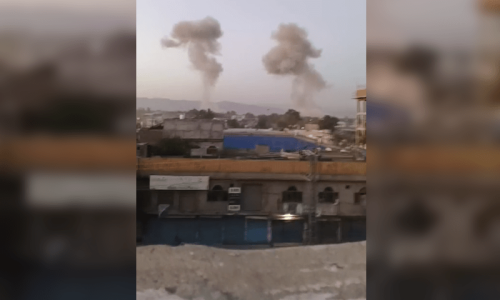Energy Minister Khurram Dastgir asserted on Thursday that the PML-N-led coalition government's commitment to stabilise Pakistan's economy and prevent the effects of an "international energy crisis" from manifesting in the country was clear as petroleum product reserves were at a "record level".
Dastgir, who was addressing a press conference in Islamabad alongside State Minister for Petroleum Musadik Malik, said this as he drew comparisons between Pakistan and "another country in the region that is facing economic difficulties".
While he did not name the country in this instance, the comparison was an apparent reference to Sri Lanka, the island nation of 22 million that has been reeling from economic crises for months, which prompted widespread protests that brought down the president.
Read: Lankan meltdown lessons
"A comparison is necessary," he said, adding that the biggest indication of economic turmoil in the country was that it ran out of petroleum products.
"People had to stand in queues for four days to get petrol. But here, we have diesel stocks that will last for two months and those of petrol for 34 days," Dastgir said. "
So it should be clear that this broad-based government is [working] to stabilise the economy ... [and] protect the people of Pakistan from the effects of an ongoing international energy crisis as much as possible."
He added that the government was also monitoring other resources of energy production so that the "economy is not affected".
Dastgir assured that the government had started taking measures to stabilise the economy and the inflows and outflows of foreign exchange were now "balanced".
Moreover, he added that circular debt had been reduced by Rs214 billion over the last three months.
He said inflows were expected in the coming days as a staff-level agreement had been reached with the International Monetary Fund that would eventually stabilise the rupee and bring the balance-of-payments crisis to an end.
"And by September or October, Pakistanis will also see that inflation will start decreasing," he said.
'Import bill significantly reduced'
When he spoke, Musadik Malik said imports of petroleum products between June 2021 and June 2022 had reduced by around 9pc.
"This has significantly reduced our import bill," he said, adding that the government was expecting further improvement on this front in July.
He said his ministry was managing the matters on a daily basis and were not allowing any unnecessary imports.
The minister, too, said that there was no risk of a shortage of petroleum products as the country had "record-high" petrol and diesel reserves.
'Attractive solar policy'
Dastgir further said that progress had been made in talks between an informal delegation from Pakistan and the Afghan authorities regarding a new coal venture.
"It was discussed that if a supply chain is built for this venture and if this happens, doors will open for trade with Central Asia," he said.
The minister also said that after power tariff rebasing, subsidies will be provided to "protected classes" so that they did not have to bear the impact of the increase in rates.
Moreover, he said an "attractive" solar policy would be announced at the start of August to provide relief to the salaried and middle class.
The shift to solar energy under this policy would also decrease the country's reliance on foreign fuel, he said, adding that an export tariff for gas and electricity would also be announced in the coming days.
'Political forecasts can't be made based on by-polls'
At the start of his press conference, Dastgir reiterated the government's stance that general elections would be held in October next year. "And political upheaval before that is part of democracy," he added.
The minister also spoke about the recently held Punjab by-polls, in which the PTI had a resounding victory after bagging 15 of the 20 seats for which the elections were held.
"We respect the public mandate but it should also be put before the people that political forecasts cannot be made on the basis of by-elections on just five per cent seats of the Punjab Assembly," he said, adding that representatives on 95pc seats in the provincial assembly were those elected in the 2018 general elections.
Moreover, he continued, it was also important to "remind people that the PML-N is the party in the majority in the Punjab Assembly after the 2018 elections".
To reduce the PML-N's majority, tactics such as "horse-trading and influencing independent lawmakers" were employed and the PTI came to power in Punjab, he alleged, adding that the by-elections of July 17 could not undermine the "destruction of 2018, stealing of the mandate and cutting the roots of democracy by Imran Khan".
He also asserted that no violence and rigging took place during the by-polls.
'Imran's narratives crushed'
The energy minister held the PTI responsible for the economic chaos in the country.
"Whenever Imran's fitna rears its head, Pakistan's economy begins to destabilise," he remarked.
Moving on to reflecting on the recent fluctuations in the exchange rate, with the rupee posting a persistent decline against the dollar, and the bearish trend in the stock market, he said it was a manifestation of "Imran's agenda to keep the economy unstable".
He further outlined four "narratives" played out by PTI chief Imran Khan, namely of a US conspiracy, that of "Mr X and Y and neutral and animal", the narrative against the Election Commission of Pakistan and that against the judiciary after its detailed judgement on former deputy Qasim Suri's April 3 ruling on the no-confidence motion against then-prime minister Imran.
All of these narratives were crushed on July 17, Dastgir said.
He said there was a fifth narrative played out by the PTI, calling it a "nappy narrative".
Here, without elaborating much, Dastgir referred to "candidates contesting against PML-N holding a press conference before joining the PTI".
"So it is important who changed whose nappies, and who will change whose nappies in Lahore tomorrow," he said, when the election for the post of the Punjab chief minister would be held.
He went on to say that due to Imran's "ill-mannered" speech, which was also "contrary" to the Constitution, the country's progress was hampered and the economy and democracy were suffering.
The minister said observers were concerned that due to "Imran's fitna", Pakistan may be heading in the same direction as Sri Lanka.
While he admitted that people were facing difficulties due to inflation and the rise in petrol prices, the minister said the incumbent government was only responsible for measures taken after April 19, when Prime Minister Shehbaz Sharif's cabinet was formed.
For the destruction and factors leading to it before that, the previous government was to be held responsible, he added.














































